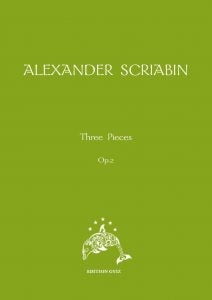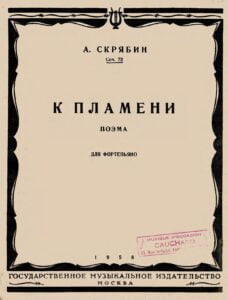Scriabin 24 Preludes, Op 11 with sheet music (available from our Library).

Scriabin’s biography
Alexander Nikolayevich Scriabin Russian: Александр Николаевич Скрябин ; 6 January 1872 – 27 April was a Russian composer and pianist. In his early years he was greatly influenced by the music of Frédéric Chopin, and wrote works in a very tonal, romantic style. Later, and independently of his highly influential contemporary, Arnold Schoenberg, Scriabin developed a substantially atonal and much more dissonant musical language, which accorded with his personal brand of mysticism.
Scriabin was influenced by synesthesia, and associated colours with the various harmonic tones of his atonal scale, while his colour-coded circle of fifths was also influenced by theosophy. He is considered by some to be the main Russian Symbolist composer.
Scriabin was one of the most innovative and most controversial of early modern composers. The Great Soviet Encyclopedia said of Scriabin that “no composer has had more scorn heaped on him or greater love bestowed.” Leo Tolstoy described Scriabin’s music as “a sincere expression of genius.” Scriabin had a major impact on the music world over time, and influenced composers such as Igor Stravinsky, Sergei Prokofiev, and Karol Szymanowski.
However, Scriabin’s importance in the Russian and then Soviet musical scene, and internationally, drastically declined after his death. According to his biographer Bowers, “No one was more famous during their lifetime, and few were more quickly ignored after death.” Nevertheless, his musical aesthetics have been reevaluated since the 1970s, and his ten published sonatas for piano have been increasingly championed in recent years.
Scriabin’s funeral, on 16 April 1915, was attended by such numbers that tickets had to be issued. Rachmaninoff, who was a pallbearer at the funeral, subsequently embarked on a grand tour of Russia, performing only Scriabin’s music for the benefit of the family. It was the first time Rachmaninoff had publicly performed piano music other than his own. Sergei Prokofiev admired the composer, and his Visions fugitives bears great likeness to Scriabin’s tone and style.
Another admirer was the English composer Kaikhosru Sorabji, who promoted Scriabin even during the years when his popularity had decreased greatly. Aaron Copland praised Scriabin’s thematic material as “truly individual, truly inspired”, but criticized Scriabin for putting “this really new body of feeling into the strait-jacket of the old classical sonata-form, recapitulation and all”, calling this “one of the most extraordinary mistakes in all music.”
Style
If there is one defining feature of Scriabin’s output, whether at its most voluptuous or neurotic, it’s probably this: freedom. So many of Scriabin’s defining tendencies – polyrhythms, trills, vibrating arpeggios, grace notes, misplaced accents, dominant 7ths, extended or synthetic chordal harmony as substitute for tonality – are all designed to erase the sense of music as a deliberate, performative act, and to turn it into a kind of spontaneous, refulgent, *sensory* experience, whether that experience is expressive or (especially in his later years) mystical.
In this early set of preludes, encompassing all 24 keys, you can already see lots of Scriabinisms at work: notes arranged in groups of 5, with tuplets crossing barlines and accents placed such that it’s basically impossible to hear the downbeats (Nos.1, 19), uneven or mixed meter (Nos.16, 21, 24), counterpoint of a particularly lush and exultant kind (Nos.7, 11), the use of quartal textures (No.1, No.24), polyrhythmic playfulness (No.1’s 5-against-3, Nos.3, 18, 24), dramatic melodies played entirely in octaves (Nos. 6, 14, 20) or fragmentary motifs arranged into winding, wistful two- or three-voice contrapuntal shapes (Nos. 2, 3, 5, 9, 13, 21-23).
It’s a real shame this group of preludes is often gently dismissed as too unoriginal (Chopinesque), because It’s a gorgeous set, beautifully written, with not a single wasted or misplaced note, and which contains many wonderful moments. It’s nowhere near as radical as Scriabin’s later work, true, but its works perfectly on its own terms. (And originality is only a measure of historical importance, not musical quality.)
Both recordings here (in the unknown-but-really-excellent class) have the headily luminous quality of the best Scriabin playing, but are markedly different. Lettberg has a relaxed, languorous approach, focusing more on establishing a certain tone or mood than strictly maintaining the melodic line. Stanev’s playing is charged with excitement: he plays as freely as Lettberg, but more readily veers towards the impetuous end of the expressive spectrum, and also has a pretty nice way of handling the long lines in the slower preludes.
Browse in the Library:
Or browse in the categories menus & download the Library Catalog PDF:
Track List
Lettberg: 00:00 – No.1, Vivace 00:54 – No.2, Allegretto 03:05 – No.3, Vivo 03:59 – No.4, Lento 06:06 – No.5, Andante cantabile 08:03 – No.6, Allegro 08:53 – No.7, Allegro assai 09:50 – No.8, Allegro agitato 11:20 – No.9, Andantino 13:09 – No.10, Andante 14:31 – No.11, Allegro assai 15:56 – No.12, Andante 17:41 – No.13, Lento 19:33 – No.14, Presto 20:31 – No.15, Lento 22:52 – No.16, Misterioso 25:15 – No.17, Allegretto 26:08 – No.18, Allegro agitato 27:00 – No.19, Affettuoso 28:06 – No.20, Appassionato 29:12 – No.21, Andante 30:46 – No.22, Lento 32:17 – No.23, Vivo 32:52 – No.24, Presto
Stanev: 33:46 – No.1, Vivace 34:39 – No.2, Allegretto 36:32 – No.3, Vivo 37:29 – No.4, Lento 38:58 – No.5, Andante cantabile 40:28 – No.6, Allegro 41:23 – No.7, Allegro assai 42:26 – No.8, Allegro agitato 44:20 – No.9, Andantino 45:37 – No.10, Andante 46:47 – No.11, Allegro assai 48:28 – No.12, Andante 49:49 – No.13, Lento 51:05 – No.14, Presto 52:05 – No.15, Lento 53:48 – No.16, Misterioso 55:45 – No.17, Allegretto 56:29 – No.18, Allegro agitato 57:28 – No.19, Affettuoso 58:39 –No.20, Appassionato 59:42 – No.21, Andante 1:01:28 – No.22, Lento 1:02:35 – No.23, Vivo 1:03:15 – No.24, Presto
Download Scriabin’s sheet music from our Library.

